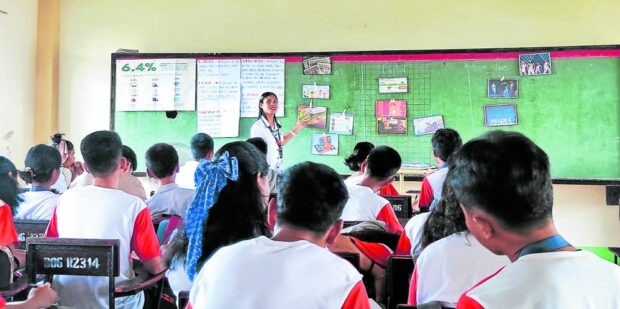DepEd taps student teachers to improve reading, math skills in Bicol

DEMO TEACHING A senior education student from Bicol University delivers a lesson to Grade 10 students during her final teaching demonstration at Ligao National High School in Ligao City in Albay on Dec. 6. Next year, aspiring teachers like her will help struggling elementary and high school students in the Bicol region with their literacy and numeracy issues. —JOHN MICHAEL MANJARES/CONTRIBUTOR
LEGAZPI CITY — Since the COVID-19 pandemic caused class disruptions in the country in 2020, the Department of Education (DepEd) in Bicol has tapped several teacher-volunteers from public and private universities and colleges in the region to recover the learning loss among young learners.
This volunteer-drive activity has now evolved into the “6Bs: Bawat Batang Bicolano Bihasang Bumasa at Bumilang” (every Bicolano child is proficient in reading and numeracy), which will start in January 2024, meant as a reinforcement to the learning recovery program of DepEd Bicol focusing on improving the literacy and math proficiency of public school students in Grades 4 to 10, with the assistance of students of the teacher education institutions (TEIs) and other stakeholders in the region.
Quoting the report of the World Bank in 2021, Maria Cristina Baroso, focal person of the Project 6Bs, said the “global learning poverty,” defined as the percentage of children who are unable to read and understand a simple text by age 10, increased from 50 percent to approximately 63 percent since the beginning of the pandemic.
“If we backtrack, these Grade 4 learners were Grade 2 during the height of the pandemic, they were still on the stage of learning how to read. If they were not really assisted by their parents through modules, they would possibly struggle during the resumption of the in-person classes,” Baroso said in a phone interview on Saturday.
READ: DepEd to distribute ‘hostaged’ learning resources to public schools soon
She said the current students in Grades 7 and 8 would also face difficulty if their proficiency in reading and mathematics was not developed during their modular learning in elementary.
With the memorandum of agreement with 33 TEIs in the region, the third- and fourth-year students taking education courses will have one-on-one tutorial sessions with learners who are struggling with reading and numeracy. They may schedule intensive classes with the elementary and junior high students after school hours and on weekends in strategic spaces in schools or their own villages or communities, she said.
DepEd records showed that there are around 1 million students in Grades 4 to 10 enrolled in the region’s public schools for the school year 2023-2024.
But the number of poor learners in math and reading will still have to be assessed by January next year, although they are estimated to be about 10 percent of this number, according to Gilbert Sadsad, DepEd Bicol director.
READ: DepEd reports early steps to revise ‘congested’ K-12
Reading program
The reading program would cover the six elements for explicit reading instruction such as oral language, phonological awareness, phonics, vocabulary, fluency and comprehension.
In 2021, DepEd launched the “Brigada Pagbasa” through a partnership with the teacher applicants, working professionals, education graduates, community officials, parents, and other organizations.
The intervention in enriching the learners’ numeracy skills will also focus on basic mathematics such as addition, subtraction, and multiplication.
The volunteers also handled the Grades 4 to 10 learners, but Baroso said with the Project 6Bs, the partnerships would be widened, and more learners would benefit since more college students would be helping the DepEd teachers in recovering the learning loss due to the pandemic.
“The old adage that it takes a village to educate a child is still true until now because it will not be achieved by DepEd alone, we need collaborative efforts,” Baroso added.
Target learners
The initiative will also cater to Grades 1 to 3 who had benefited from the 8-Week Learning Recovery Curriculum, a learning remediation and catch-up intervention launched in 2022 that centered on teaching foundational literacy and numeracy skills to those who suffered from learning loss because of the implementation of distance learning.
Sadsad said they would conduct a literacy and numeracy assessment in January 2024 to identify the Grades 4 to 10 learners who need tutorial sessions.
“Although we are already implementing the 8-week curriculum and other intervention programs for the students’ literacy and numeracy, we found it necessary to add more volunteers that will help our public school teachers,” he said in a separate interview on Wednesday.
Sadsad said they hoped that after three years of implementation of Project 6Bs, there would be fewer struggling learners in classrooms and that quality education would be attained.
He said they were also asking the local government units and other stakeholders to put up reading spaces and library facilities in their localities to help the learners in developing the habit of reading.